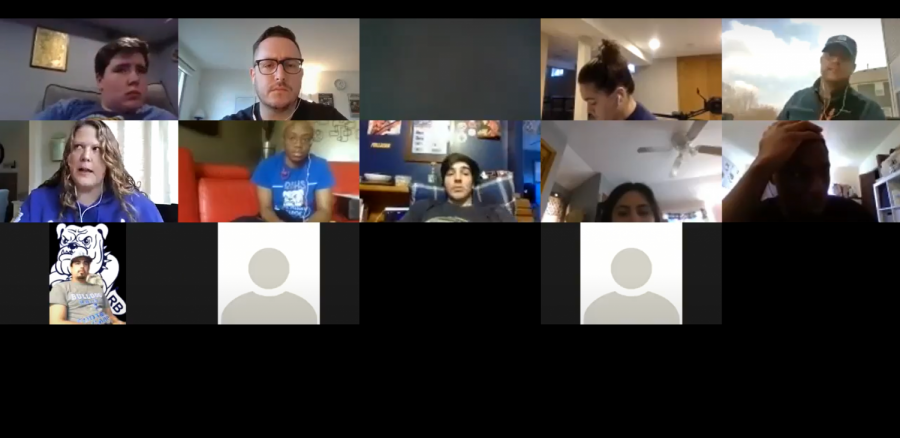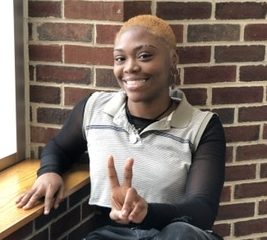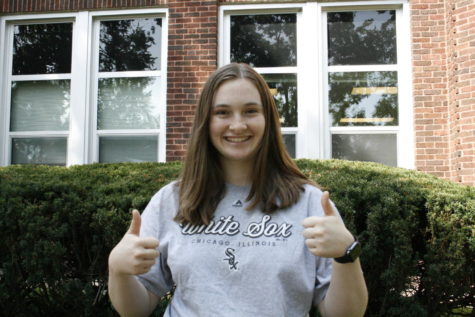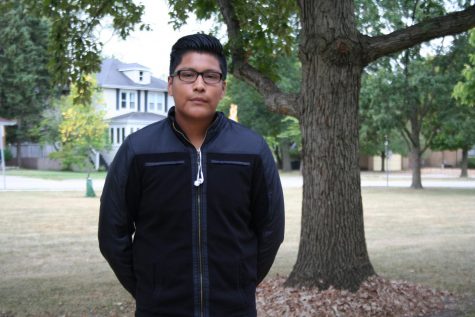Admin team supporting students in spite of COVID-19 uncertainty
Screenshot taken by Marc Helgeson
Screenshot of the Zoom meeting held between the Clarion staff and three administrators.
April 17, 2020
On April 7, 2020, the Clarion staff held a press conference via Zoom with three administrators: Principal Dr. Héctor Freytas, Assistant Principal for Student Affairs David Mannon, and Assistant Principal for Curriculum and Instruction Kylie Lindquist. In the conference, they answered questions regarding Riverside Brookfield High School’s operations during the building’s shutdown due to COVID-19. Below is a transcript of that conversation. Answers have been lightly edited for clarity.
THE ADMINISTRATOR’S PERSPECTIVE
Q: How is the administration operating and communicating with each other outside of school, especially with these big decisions that you have to make with extending how long we’re out and certain operations that normally run now that we’re not technically in school?
FREYTAS: We’re meeting practically every day, so as far as our building leadership meetings, our meetings with our instructional coaches, our meetings with the district, the superintendent, and the assistant superintendent, all of our meetings are still happening, everything that is scheduled, but instead of person-to-person, we’re doing it using Zoom. We’re still operating as if school is happening. For me, I plan out my Monday through Friday, if I’m available, just as my assistant principals, to answer questions from students, from parents, from one another. My day is still standard. What’s nice is that I get to wear a t-shirt, the minute I’m done with a meeting, I go home and my wife and kids are there. No driving, no commuting, no pausing, but other than that, all of the administrators and all of the teachers are still working our regular, normal days, we’re just using Zoom to communicate.
LINDQUIST: Grown-ups [and] administrators aren’t that different in some ways, so we have a master group text where if our superintendent needs us he can kind of throw the bat signal up … You know it’s weird for us because in such a small building I’m used to if I have a question or if I need to work something out I just show up in Mr. Mannon’s office … We’re also trying to stay in contact with the different people that are on our teams so I meet pretty regularly with instructional coaches for the departments. Last week we had a meeting with all of our administrative assistants so that we can check in with Ms. Bouchemy and Ms. Mollo and my assistant Ms. Spry, and we can talk to them about projects that they’re working on. And a lot of the discussions that we have right now revolve around ‘how can we make up for some of what is lost during all of this time?’ ‘How can we support students and take the feedback we’re receiving from students, parents, teachers and make this experience as painless as we possibly can?
MANNON: We all have assigned tasks, and roles that were assigned to, so I oversee operations, security, and activities right, so Ms. Lindquist oversees curriculum and instruction, [and] Dr.Freytas is pretty much over all of us. He’s just making sure that you know our operational calendars which we have in place, are continuing, just in a different format. So we all have been very busy, Ms.Lindquist and Dr.Freytas especially on the curriculum side because at the drop of a hat we went from a classroom experience to a virtual experience within a week. So to pull that off, and to have 150 teachers on board, with expectations for grading and getting that articulated out to our staff, our kids, our community, that’s been a big push. The security side of it [has been] making sure that we have lunches for everybody, making sure that our buildings are secure, that places are getting sanitized, that were working with our operations and maintenance people you know, and working with the deans on other stuff, and trying to stay connected to you guys, it’s been a lot to try to tackle virtually.
Q: What has this whole experience been like for you guys?
LINDQUIST: This is weird. You know when you’re going through something or something’s happening that you’ve never experienced before and you don’t really realize how crazy it is until you’re on the other side of it? Like I remember sitting in the superintendent’s conference room with all of the administration around a table the first time we heard that this was a possibility, and when you’re in those moments, you have 1600 students that you have to think about and 100 teachers and support staff and you don’t have time to kind of take a step back and go ‘oh my god we’re talking about taking school and moving it home’. So you’re kind of running on adrenaline and you’re in total problem solve mode. Thank goodness that we already had an accepted e-Learning plan like Dr. Freytas said. Instructionally, we were ready for how all of it would work. We just had to wrap our minds around the bigger picture things because e-Learning was never designed to be extended … I feel like I’m in a movie sometimes because it doesn’t seem real. Because like I said .. you’re just in problem-solving mode and you’re just doing your best to do what you can for kids so you don’t really have an opportunity to react about it yourself as a person until you kind of get on the other side of it and so that’s been really interesting for me, kind of reacting to it later than I would have normally.
FREYTAS: We miss you guys, we miss the daily contact. I love hearing about your part-time jobs, your classes, your struggles, your successes, your practices. I miss human contact, I’m a social bug, so I miss seeing you guys, talking with your parents, but I’m working under the premises of “let’s practice physical distancing, not social distancing”. We could stay together via email, via Zoom, and that’s how I’ve been connecting with you guys, with your parents, with the teachers. It’s a bummer: a wrench has been thrown at our momentum after a great pep rally, after a great season, after high marks. We had so many things coming up: senior awards, the S.C.O.T.Y [School Citizen of the Year] award, things that I wanted to celebrate physically and give you guys a high-five and even a hug, just to recognize how much work you’ve done. It’s a little bit of a downer, but I’m very appreciative of Ms. Lindquist, Mr. Mannon, my admin team for being prepared because our e-learning plan is for emergencies, and we didn’t know it would be this emergency. We’ve had this plan since November, as far as what e-learning would look like, what the specifics would be. Granted there are some specific details that have evolved since we’ve received specific direction from the state. I felt prepared, but what I wasn’t prepared for was how much I was going to miss human contact, miss you guys, miss my team. I’m doing extra phone calls, having extra meetings, but I miss that presence. That’s how I feel personally.
RESCHEDULING ACADEMIC AFFAIRS, CELEBRATORY EVENTS, AND OTHER ACTIVITIES
Q: Are there any plans, if we do return, for some sort of pseudo-graduation ceremony? What are you guys planning to do about graduation?
MANNON: As far as prom, obviously we had to cancel the date, due to the governor and his expectations. But, we’re going to try to do something for all of you juniors and seniors to give you an experience, as far as whatever that may be, we’re looking at options right now. I don’t want to get too much into detail, but we are planning something.
FREYTAS: As far as graduation, graduation is scheduled for that day [May 22]. However, we know that things are changing every day. We haven’t canceled it or rescheduled it, but we’re not going to make an official decision until later in the month of April or beginning of May, but I want everybody to know that we’re going to do everything in our power, everything we can do as a building leadership team, working with your parents and working with the teachers and the district to try to give you guys a graduation experience of some sort. Whether that’s in person or virtually, we’re going to try to make something happen. It feels weird because we’re in a waiting game. We cannot make a decision at RB until we hear from the state and until we partner up with our superintendent and the district, of course. We’re still waiting on that, and even for prom, even though prom is officially canceled, we are still going to do whatever we can in our power, as long as it is safe and it is approved, to come back together and have some kind of celebratory social of some sort. I don’t know what that is yet, I don’t know what that looks like, but we are working out of the ‘how can we’, not the ‘we can’t’. Whenever we talk to each other we ask each other, how can we do a graduation? How can we do a culminating prom? … Please stay tuned, watch out for emails, please stay connected to our website, answer any robocalls that we have, but we’re doing our best to try to have some kind of culmination gathering for the most important events.
Q: If we don’t end up going back to school, how will finals be handled?
LINDQUIST: So we are talking about that [how finals will be handled] right now, and we likely are not going to make a decision before the governor makes a decision, and we’ve been following his guidelines. If we are not going to end up going back to school my gut tells me that we’re going to have to forgo our final exams. That’s something that we have only discussed very briefly as a possibility so we haven’t vetted what that would totally look like yet but as we continue to realize we may not be able to be back in close proximity enough to start school back we have to talk through what that would look like from the final exams standpoint. One option obviously is to cancel those and let the grades stand without the final exam grade and then the flip side of that would be figuring out a way that all of those exams can be done remotely but that’s not something that we have discussed yet extensively through our instructional coaches or full teaching staff. It’s kind of one of those things that’s next on the table, and we’re really not trying to rush any kind of decision in all of this. We’re kind of really working to try to make sure we’re really conscious about what we cancel and about what we kind of throw in the towel on because we want to remain hopeful and optimistic while at the same time recognizing the science behind the situation that we’re in so that’s just something that’s on the table at this point as to how we’re going to handle that.
Q: Have any spring sports at RB made plans to continue their seasons?
FREYTAS: We’re scheduled throughout the spring. For example, games that would be played now, in early April, are obviously cancelled because we cannot have contact. If we were to go back to school at the end of the month or early May, whatever games are scheduled then, we would continue.
MANNON: Our schedule is kind of scheduled out, so we’re in kind of a waiting pattern until we get word from the state that we can continue to play. So when and if that happens, we’ll just complete the schedule that’s already in place for all of our sports and all of our levels. But we need to definitely wait on the IHSA and a confirmation from them, before we can give a green light for our kids to go too.
Q: Will the notifications for local scholarship winners be delayed at all?
LINDQUIST: Ms. Augustine, [is] the Assistant Principal for Student Services and oversees that local scholarship night that I think was coming up sometime soon … They are going to do a virtual local scholarship night I believe, they are working on that in Student Services so I don’t see any major delays with regard to finding out about those local scholarships. So I think you should be okay there and I want to say with regard to the seniors and the schools [colleges] and all of that kind of stuff, let us know, reach out to your counselors, or even a trusted teacher, an administrator … Your teachers, your counselors, your administrators, we have all gone through conversations like that with our seniors … The adults around you have some experience in helping students really narrow their focus and try to help you make a decision so don’t suffer in silence on that. If there is someone within RB that you trust, you feel like you would be able to kind of have an objective conversation with we are happy to help you make those decisions because we know that making them in a vacuum is hard so that’s something you can certainly reach out to the myriad of people you have at your disposal through your email … let somebody support you through that because I know that’s a lot on your shoulders when you’re deciding where to go to school.
E-LEARNING IMPROVEMENTS
Q: Are you still trying to improve the e-learning experience for students?
LINDQUIST: The answer is yes, absolutely. One of the things I’m trying to do through all of this, and it’s not easy, is see what positive is coming out of this. How can this turn into something that is good? And I think that when e-Learning came to be it was meant to be something in lieu of an emergency snow day. Like last year when we did two in a row, we even thought that was weird like, ‘woah we’re doing two in a row, this is crazy.’ So now that we’ve been on an extended period of time we’re having the ability to have conversations about delivery of instruction and continuity of instruction and continuing with learning without the brick and mortar school. So, we have done some things with expanding our resources to allow for certain teachers to be able to, for example, reach more students via Screencastify. We used to have a very basic subscription to Screencastify that only allowed a teacher to record five minutes and we’ve now expanded that because there were teachers who said ‘you know I need to be able to give my students a recording that’s longer than five minutes because I’m using this platform over a number of days.’ And we’re also able to see sort of more of the student experience end of this … Dr. Freytas [and] the teachers get feedback from the students and the parents so we’re able to see how what was in our mind really [is] working in practice. There’s a whole lot to be said about the difference between theory and practice and so since we are in this expanded opportunity, like I said I’m trying to see this as an opportunity in some ways, we really can examine how our students are learning remotely, or through these different vehicles that we have accessible through technology. So I think it’s allowing us to improve on our plan as a whole and I would also say that I think it is starting to change the way that people think about all kinds of things in terms of grading, in terms of philosophy, in terms of how we deliver instructions to students. So the other sort of opportunity that’s growing out of this for me is we are having conversations as a staff about educational philosophy in general and how do we not just do remote learning, but how do we all across the board do a better job of reaching our students and meeting our students’ needs.
POSSIBLE EFFECTS OF THE SCHOOL’S EXTENDED SHUTDOWN
Q: Do you see this affecting the curriculum for next year?
LINDQUIST: I think that where you probably would see that [next year’s curriculum being affected by the extended quarantine break] the most, and I think the instructional coach and the department would agree with me, would be in math. Math builds on itself so much. So If you’re a student who is now a sophomore in geometry and there are certain things within that curriculum that you need to know to be successful at your next level, that next level I think they’re really going to have to consider that when they start teaching next year if this continues to go longer … As teachers, you know when I was in the classroom I understood that my students had a certain group of skills when they got to me because I worked vertically with my colleagues. We knew what a student was supposed to be able to do by the end of the class before me. And so I think that we are really going to have to think about, especially at the beginning of the year next year, regardless of when we go back or if we do, we’re going to have to look at some pretesting, we’re going to have to look at our teachers going in and getting a feel for truly where a student’s skill is just to have an idea of, ‘now as a teacher how do I meet you where you are?’ So I think data-driven instruction will be really important to see where kids are after all of this is over, whenever that is, and I also think that we really are going to need to make sure that we do a good job as instructors of meeting kids at the level where they are and then moving you forward. So I think we would be naive to think that it wouldn’t have an impact next year and I think that within each department there are different ways of handling that like I said, I think math is definitely one that’s going to be very impactful, also maybe a science too where you’re learning particular skills that carry you on through other courses in a discipline so I think we really are going to have to do some serious looking at where our students’ skills are when we get you guys back in school, where we feel most comfortable figuring that out.





